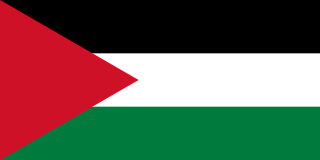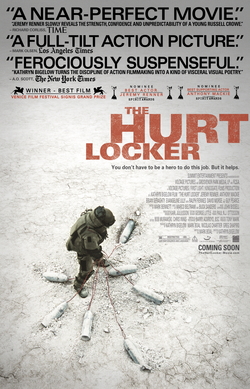
Saddam Hussein was an Iraqi politician and revolutionary who served as the fifth president of Iraq from 1979 to 2003. He also served as prime minister of Iraq from 1979 to 1991 and later from 1994 to 2003. He was a leading member of the revolutionary Arab Socialist Ba'ath Party and later its Iraqi regional branch. Ideologically, he espoused Ba'athism, a mix of Arab nationalism and Arab socialism, while the policies and political ideas he championed are collectively known as Saddamism.
In politics, hard power is the use of military and economic means to influence the behavior or interests of other political bodies. This form of political power is often aggressive (coercion), and is most immediately effective when imposed by one political body upon another of less military and/or economic power. Hard power contrasts with soft power, which comes from diplomacy, culture and history.

The Gulf War was an armed conflict between Iraq and a 42-country coalition led by the United States. The coalition's efforts against Iraq were carried out in two key phases: Operation Desert Shield, which marked the military buildup from August 1990 to January 1991; and Operation Desert Storm, which began with the aerial bombing campaign against Iraq on 17 January 1991 and came to a close with the American-led liberation of Kuwait on 28 February 1991.

Basra Governorate, also called Basra Province, is a governorate in southern Iraq in the region of Arabian Peninsula, bordering Kuwait to the south and Iran to the east. The capital is the city of Basra, located in the Basrah district. Other districts of Basra include Al-Qurna, Al-Zubair, Al-Midaina, Shatt Al-Arab, Abu Al-Khaseeb and Al-Faw located on the Persian Gulf. It is the only governorate with a coastline.

Alqosh is a town in the Nineveh Plains of northern Iraq, a sub-district of the Tel Kaif District situated 45 km north of the city of Mosul.

During the early stages of the Iraq War, members of the United States Army and the Central Intelligence Agency committed a series of human rights violations and war crimes against detainees in the Abu Ghraib prison in Iraq, including physical abuse, sexual humiliation, physical and psychological torture, and rape, as well as the killing of Manadel al-Jamadi and the desecration of his body. The abuses came to public attention with the publication of photographs of the abuse by CBS News in April 2004. The incidents caused shock and outrage, receiving widespread condemnation within the United States and internationally.

Kadhimiya or Kadhimayn is a northern neighbourhood of the city of Baghdad, Iraq. It is about 5 kilometres (3.1 mi) from the city's center, on the west bank of the Tigris. 'Kadhimiya' is also the name of one of nine administrative districts in Baghdad. As the place of al-Kadhimiya Mosque, even before its inception into the urban area of Baghdad, it is regarded as a holy city by Twelver Shia muslims.

An Iraqi insurgency began shortly after the 2003 American invasion deposed longtime leader Saddam Hussein. It is considered to have lasted until the end of the Iraq War and U.S. withdrawal in 2011. It was followed by a renewed insurgency.

The Anglo-Iraqi War was a British-led Allied military campaign during the Second World War against the Kingdom of Iraq, then ruled by Rashid Gaylani who had seized power in the 1941 Iraqi coup d'état with assistance from Germany and Italy. The campaign resulted in the downfall of Gaylani's government, the re-occupation of Iraq by the British, and the return to power of the Regent of Iraq, Prince 'Abd al-Ilah, a British ally.
The Saddam–al-Qaeda conspiracy theory was based on false claims by the United States government alleging that a secretive relationship existed between Iraqi president Saddam Hussein and the Sunni pan-Islamist militant organization al-Qaeda between 1992 and 2003. U.S. president George W. Bush used it as a main reason for invading Iraq in 2003.

The Hashemite Arab Federation was a short-lived confederation that lasted from 14 February to 2 August 1958, between the Hashemite kingdoms of Iraq and Jordan. Although the name implies a federal structure, it was de facto a confederation.
Camp Nama was a military base in Baghdad, Iraq, originally built by the government of Saddam Hussein, from which its name derives, and now used by Iraqi military forces. Purportedly, the original Iraqi name has been repurposed by U.S. personnel involved with the facility as a backronym standing for "Nasty Ass Military Area".
A connection between Iraq and al-Qaeda came through an alleged meeting between September 11 hijacker Mohamed Atta and Iraqi consulate in April 2001. This alleged connection is notable because it was a key claim used by the Bush administration to justify the 2003 U.S.-led invasion of Iraq. The Czech counterintelligence service claimed that Mohamed Atta el-Sayed, a September 11 hijacker, met with Ahmad Samir al-Ani, the consul at the Iraqi Embassy in Prague, in a café in Prague. This claim, sometimes known as the "Prague connection", is generally considered to be false and has been said to be unsubstantiated by the Senate Intelligence Committee in the United States.

Iraq, officially the Republic of Iraq, is a country in West Asia and in the geopolitical region known as the Middle East. With a population of over 46 million, it is the 30st-most populous country. It is a federal parliamentary republic that consists of 18 governorates. Iraq is bordered by Turkey to the north, Iran to the east, the Persian Gulf and Kuwait to the southeast, Saudi Arabia to the south, Jordan to the southwest, and Syria to the west. The capital and largest city is Baghdad. Iraqi people are diverse; mostly Arabs, as well as Kurds, Turkmen, Assyrians, Armenians, Yazidis, Mandaeans, Persians and Shabakis with similarly diverse geography and wildlife. Most Iraqis are Muslims – minority faiths include Christianity, Yazidism, Mandaeism, Yarsanism and Zoroastrianism. The official languages of Iraq are Arabic and Kurdish; others also recognized in specific regions are Turkish, Suret, and Armenian.

Kurds in the United States refers to people born in or residing in the United States of Kurdish origin or those considered to be ethnic Kurds.

The Hurt Locker is a 2008 American war thriller film directed by Kathryn Bigelow and written by Mark Boal. It stars Jeremy Renner, Anthony Mackie, Brian Geraghty, Christian Camargo, Ralph Fiennes, David Morse, and Guy Pearce. The film follows an Iraq War Explosive Ordnance Disposal team who are targeted by insurgents and shows their psychological reactions to the stress of combat. Boal drew on his experience during embedded access to write the screenplay.
Between a rock and a hard place, or simply a rock and a hard place, is an expression meaning having to choose between two difficult options. It may also refer to:

Safa Abdul-Aziz Khulusi was an Iraqi historian, novelist, poet, journalist and broadcaster. He is known for mediating between Arabic- and English-language cultures, and for his scholarship of modern Iraqi literature.

Sweden is home to one of the largest communities of the Mandaean ethnoreligious group, numbering between 10,000-20,000 people (2019). By comparison, there are now only about 3,000 Mandaeans in Iraq. Several thousand Swedish Mandaeans were granted asylum status as refugees from persecution in Iraq and Syria.

Amjad Attwan is an Iraqi professional footballer who currently plays for Zakho in the Iraqi Premier League. He can be deployed as a defensive midfielder or central midfielder.















